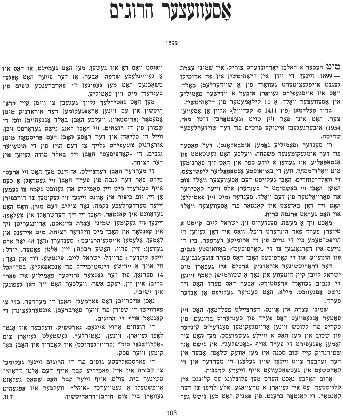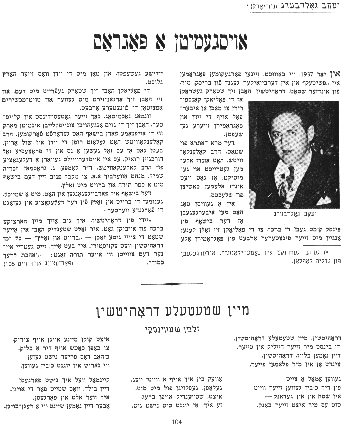Previous Page
|
Next Page

[
Page 103
]
THE DEATHS IN OSEVETZ [OSEWEC]
1899
More than half a century ago, in 1899, the Jews in Drohitchin and the surrounding area were shocked by a horrible murder of a Jewish family in the Osevetz forest, 10 kilometers from Drohitchin.
Before his death on May 1, 1954, Baruch Feldman (from 1411 S. Kedwill), originally from Osevetz, told us about the horrible murder.
R. Sender (whose last name is unknown), the father of the murdered family, who originated in Antapolia, was a scholarly individual and involved in the lumber business. When the famous Lifshitz family of Antapolia, also in the lumber business, bought the Osevetz forest to cut down timber, they hired R. Sender as their treasurer and manager of the forest. Sender and his family moved into the office of the Osevetz forest and made a good living.
Sender's son, Yisrael Leib, bought an expensive horse for a hundred rubles. This event was a major topic of conversation among the gentiles of the surrounding villages, and eventually became known to the korpuses, the famous thieves of Hoteva, who managed to steal the horse.
The local Drohitchin police official, Arsim, traveled with Leib to Hoteva, and after an extensive struggle, arrested the thieves. However, the horse was not found, and Sender had to buy a new one.
On the evening of the festival of Shemini Atzeret, according to Feldman, his father went to water the horse in Sender's barn. At the squeak of the key, Sender's children came out of the house and were talking. They led the horse off to overnight lodging, and since they weren't afraid of anything, they just fell asleep. At the same time, however, were lying in wait among the trees for their victims.
At approximately midnight, the church bells started ringing; it was an alarm that sent everyone running over to the office, which was in flames. Panic set in, and no one knew what was going on. People thought it was just an ordinary fire, but when the fire went out, they found the bodies of Sender and his family.
This event was immediately reported to Drohitchin, and the local police official and police chief arrived to look for evidence of the killers. They didn't have to look too far, since the footprints in the dew led them directly to the Hoteva thieves' house. The korpuses soon admitted to the murder.
The killers reported that because they had been arrested for stealing the horse, they became very angry with Sender and his family, and decided to take revenge against them. On the evening of Yom Kippur they had set out to commit the murder, but because of all the people praying in the office, the thieves became frightened and ran away. On Shemini Atzeret night, they broke into the office and committed the murder using iron bars and crowbars, they murdered everybody: Sender (48 years old) and his wife, Chasha Rivka; his elderly father, Yudel; his children Freidel, Yisrael Leib, Pintsha, David and others. They also killed a Jewish servant girl from Antapolia – a total of 14 people. Only one son, Yaakov Asher, survived - he was away in yeshiva at the time.
After stealing the family's possessions, the killers tried to hide evidence of their break-in, and burned down the house together with the dead victims. All of the killers, except for one, named Gartchik, who escaped, were put on trial in the regional court in Kobrin, and were sentenced.
The charred remains of the dead were buried together in a family grave in the old Drohitchin cemetery. The town placed a grave structure over the grave, which was preserved until the destruction of the Jewish community of Drohitchin.
D.W.

[
Page 104
]
Yaakov Goldberg (New York)*
[Photo:] Yaakov Goldberg
A POGROM
In 1937, as is known, pogroms were unleashed in the Pshiteck area and in the nearby Brisk region. We in Drohitchin were terribly scared that the Poles were conspiring to ambush the Jews and carry out a pogrom against their businesses, but the chief rabbi of Drohitchin, Rabbi Kalenkovitch, tried to comfort and calm us that G-d would protect us from harm.
One day it was heard that the bishop of Pinsk was coming to bless the Poles to continue with their dark plans to carry out pogroms against Jewish businesses, and to do with the Jews as they saw fit.
The Poles were overjoyed, and they prepared their arms and weapons of death to carry out the horrible work. On Sunday afternoon, after their religious services at church, the gentiles started gathering in the middle of the market where the reception for the bishop was to take place. Rabbi Kalenkovitch called the Jews to the synagogue to plead with G-d to perform a miracle and assure the bishop's ceremony would take place peacefully. A delegation was selected to greet the bishop; it was made up of Rabbi Kalenkovitch, Dr. Lampa, G. Grossman, Zechariah Schmid, Menachem Auerbach and others to greet the bishop with a Torah scroll and bread and salt.
The bishop passed by, smiled and took the bread and salt from the delegation, and said: "Jews of Drohitchin, I offer you my heartfelt blessings from the Eternal G-d. May you always have two good things, salt and bread, for as long as Drohitchin exists. I ask you to trust each other as the Torah says, 'Love thy brother as thyself.' (continued on page 105)
MY LITTLE TOWN OF DROHITCHIN
Zalman Shevinsky
Drohitchin, my little town of Drohitchin,
You are very holy and dear to me,
Just your name Drohitchin,
burns within me like a flame.
Once upon a time,
I was very far from you
in distance and thought –
I now miss you very much.
I am far away on a far-off road,
I ran away, I flew away, filled with courage.
Now, standing on the mountains,
I see that the youth aren't doing right.
Now my eyes look back,
To take a look at you.
I never saw this before,
how foolish I was in my youth.
I will never forget
Your picture that stands before my eyes.
I get old and forget,
But your name shines like a rainbow.
Previous Page
|
Next Page
This material is made available by JewishGen, Inc.
and the Yizkor Book Project for the purpose of
fulfilling our
mission of disseminating information about the Holocaust and
destroyed Jewish communities.
This material may not be copied,
sold or bartered without JewishGen, Inc.'s permission. Rights may be
reserved by the copyright holder.
JewishGen, Inc. makes no representations regarding the accuracy of
the translation. The reader may wish to refer to the original material
for verification.
JewishGen is not responsible for inaccuracies or omissions in the original work and cannot rewrite or edit the text to correct inaccuracies and/or omissions.
Our mission is to produce a translation of the original work and we cannot verify the accuracy of statements or alter facts cited.
 Drogichin, Belarus
Drogichin, Belarus
 Yizkor Book Project
Yizkor Book Project
 JewishGen Home Page
JewishGen Home Page
Yizkor Book Director, Lance Ackerfeld
This web page created by Lance Ackerfeld
Copyright © 1999-2025 by JewishGen, Inc.
Updated 10 Dec 2001 by LA

 Drogichin, Belarus
Drogichin, Belarus
 Yizkor Book Project
Yizkor Book Project
 JewishGen Home Page
JewishGen Home Page